INTERNACIONAL
Franklin Graham praises Trump admin’s response to deadly Burma earthquake: ‘Very generous’

As Burma, also known as Myanmar, struggles in the aftermath of a catastrophic earthquake, Reverend Franklin Graham, president of Samaritan’s Purse, praised the swift cooperation of the Burmese government and shared his confidence in a generous U.S. response under President Donald J. Trump.
«America has always been generous,» Graham told Fox News Digital.
«President Trump is not against aid. He supports aid, but he does not support waste,» Graham continued. «And that’s what’s happened in some of these cases in the past—our government has wasted too much money. But I think the president will be very generous.»
Graham also reflected on the president’s personal trials. «I believe God saved his life,» he said, referencing the assassination attempt in Butler, Pa. «And the president believes that—he says that. So we need to pray for him. There are many people that would like to see harm come to him. So we just need to pray for God’s continued protection and hand on President Trump.»
PRESIDENT TRUMP’S VISIT TO NORTH CAROLINA ‘GAVE PEOPLE HOPE’: REV. FRANKLIN GRAHAM
Samaritan’s Purse has already begun surgical operations in Naypyidaw, the capital city of Burma, which lies between Yangon and Mandalay and is among the areas most severely impacted. The organization is operating out of a soccer stadium provided by the Burmese government, which has also granted full cooperation, including visa approvals and facility access.
Graham reported that Samaritan’s Purse initially deployed 60 beds and two operating theaters. The government contributed an additional 24 beds via medical container units, known as connexes, including one operating room. «So it was 84 beds and three operating theaters,» Graham explained. «The rest of the hospital arrives tomorrow… we should be fully operational by the day after tomorrow.»
A Samaritan’s Purse medical professional prepares for surgery at the organization’s Emergency Field Hospital in Burma. The field hospital includes multiple operating theaters and is providing critical care following a deadly 7.7 magnitude earthquake. (Courtesy of Samaritan’s Purse)
According to the organization’s official press release, Samaritan’s Purse is establishing a full-scale emergency field hospital equipped with an emergency room, laboratory, pharmacy, critical care unit, and two permanent operating rooms. Nearly 100 earthquake victims were already waiting for surgery when the team arrived.
Graham emphasized urgency: «Speed is critical after a deadly earthquake like the one that rocked Myanmar,» he said. «We praise God that we are already able to provide surgery even while we are still building the full field hospital.»
One of the first patients treated was a woman who shielded her son during a building collapse. «She covered her son’s body with her body to protect him,» Graham shared. «She had problems with her spine. They had to operate on her, and she’s recovering—she’s doing well.»
DONALD TRUMP JR., KRISTI NOEM JOIN FRANKLIN GRAHAM IN HELENE-TORN NORTH CAROLINA WITH SAMARITAN’S PURSE
With over 3,500 confirmed deaths and thousands more injured or missing, the humanitarian need is immense. «People are lined up to come in, there’s just no help up there,» Graham said. «This is a very poor, very desperate part of the world… It’s going to take years for them to build back. If they can build back, I don’t know.»
Samaritan’s Purse sent more than 104 tons of critical supplies, including six water filtration systems, hygiene kits, emergency shelter material, and solar lights, aboard a 747-cargo plane from Greenville, South Carolina. They currently have more than 80 Disaster Assistance Response Team members in-country, with more arriving soon.

Earthquake survivors receive treatment at a temporary medical unit set up by Samaritan’s Purse inside a stadium provided by the Burmese government. The relief organization deployed a full-scale Emergency Field Hospital following the March 28 earthquake. (Courtesy of Samaritan’s Purse)
The organization’s logistics capacity played a vital role. «We keep all of this in stock,» Graham said. «We have warehouses here in North Carolina… So it’s just a matter of loading the boxes on the plane and going.» He noted that the hospital will need to be resupplied regularly: «About every 10 days we’ll have a plane leaving Greensboro for Myanmar.»
Temperatures in the region are exceeding 110°F with high humidity. The team lives in tents and works in austere conditions. «We provide our own accommodations. We have our own water, we have our electricity, we’re self-contained, but it’s a tough assignment,» Graham said.
Still, the team remains committed. «They’re holding clinics during the day, operating during the night… But our team is motivated. They are excited for the opportunity to serve the people of Myanmar and to do it in the name of the Lord Jesus Christ.»

Samaritan’s Purse staff and local volunteers unload emergency relief supplies from trucks in Burma. The organization airlifted more than 104 tons of aid to support victims of the 7.7 magnitude earthquake, including medical equipment, water filtration systems, and hygiene kits. (Courtesy of Samaritan’s Purse)
Samaritan’s Purse has worked in Burma before, responding to Cyclone Nargis in 2008 and maintaining a country office from 2017 to 2022.
«We need prayer, number one,» said Graham. «And of course, we always need financial help. This is a very long way from home.»
«We want every patient to know that God loves them and they are not alone. Please pray for everyone affected and for our Disaster Assistance Response Team as they serve those who are hurting in Jesus’ Name,» Graham added.
Samaritan’s Purse is a Christian humanitarian organization led by Rev. Franklin Graham, based in Boone, North Carolina. Known for rapid disaster response, it provides emergency medical care, shelter, clean water, and critical supplies in crisis zones around the world.
Operating in over 100 countries, the organization brings physical relief and spiritual hope, serving those in need in the name of Jesus Christ.
CLICK HERE TO GET THE FOX NEWS APP
For more information, visit SamaritansPurse.org.
INTERNACIONAL
Punto por Punto: en qué consiste el plan de Trump para poner fin a la guerra en Gaza
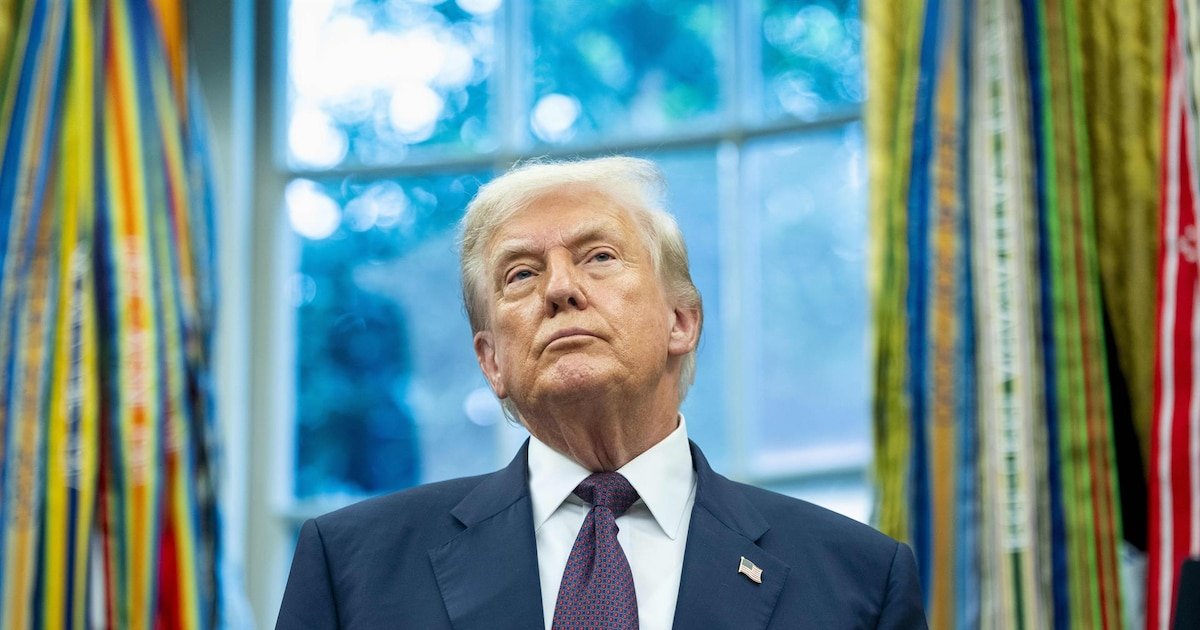
El presidente de Estados Unidos, Donald Trump, anunció que Israel y el grupo terrorista Hamas llegaron a un acuerdo para un intercambio de rehenes por prisioneros, en el marco de la primera fase de un plan global para la finalización de la guerra en Gaza.
El plan, estructurado en 20 puntos, establece los pasos a seguir en la zona de Medio Oriente. El primer punto del esquema establece que Gaza debe convertirse en “una zona desradicalizada y libre de terrorismo para que no represente una amenaza para sus vecinos”. La segunda cláusula agrega que el enclave “será reconstruido para beneficio de su población, que ha sufrido más que suficiente”.
El tercer apartado fija la condición de que, si ambas partes aceptan, “la guerra terminará inmediatamente”. Israel deberá retirarse a la línea acordada para preparar la liberación de los cautivos, mientras se congelan las operaciones militares. El cuarto punto impone un plazo estricto: “Dentro de las 72 horas de que Israel acepte públicamente este acuerdo, todos los rehenes, vivos y muertos, serán devueltos”.

El quinto punto establece el componente recíproco: tras la liberación de los rehenes, Israel pondrá en libertad a “250 prisioneros condenados a cadena perpetua, además de 1.700 gazatíes detenidos después del 7 de octubre de 2023, incluidas todas las mujeres y niños”.
También se estipula que, por cada rehén fallecido que se devuelva, Israel entregará “los restos de 15 gazatíes”.
El sexto punto aborda el tratamiento de los combatientes de Hamas. Quienes se comprometan a la “coexistencia pacífica y a entregar sus armas” recibirán amnistía, y quienes deseen salir de Gaza contarán con un pasaje seguro hacia otros países.
El séptimo compromiso abre la puerta a la asistencia humanitaria: “Al aceptarse este acuerdo, la ayuda ingresará inmediatamente en Gaza”, con volúmenes mínimos iguales a los pactados en el acuerdo del 19 de enero de 2025, incluyendo reparación de infraestructuras esenciales.
Según el octavo apartado, la distribución de esa ayuda quedará en manos de la ONU, la Cruz Roja y otras instituciones neutrales. El cruce de Rafah se abrirá en ambas direcciones bajo el mismo mecanismo del acuerdo de enero.
El noveno punto crea un gobierno provisional: Gaza quedará bajo la administración de un “comité tecnocrático palestino, apolítico, con supervisión internacional de una ´Junta de Paz´, encabezado por Donald Trump y figuras como Tony Blair”, encargado de la financiación de la reconstrucción hasta que la Autoridad Palestina pueda asumir el control.
El décimo punto introduce un “plan económico de Trump para reconstruir y revitalizar Gaza”, a cargo de expertos en desarrollo urbano del Medio Oriente. El undécimo crea una “zona económica especial con tarifas preferenciales y acceso negociado con países participantes”. El duodécimo apartado garantiza que “nadie será forzado a salir de Gaza”, aunque quienes deseen emigrar pueden hacerlo con derecho de retorno.
El punto trece excluye al grupo terrorista Hamas del futuro político del enclave: “Hamas y otras facciones acuerdan no tener ningún papel en el gobierno de Gaza, directa o indirectamente”. Todo el arsenal militar será destruido bajo supervisión internacional, con un programa de recompra de armas y reintegración financiado por donantes externos. El decimocuarto punto asegura la participación de actores regionales en la vigilancia del cumplimiento de las obligaciones para garantizar que “la nueva Gaza no represente una amenaza”.

El decimoquinto establece una Fuerza Internacional de Estabilización, que “se desplegará de inmediato en Gaza” para entrenar a la policía local y cooperar con Egipto e Israel en el control fronterizo. El decimosexto compromete a Israel a no ocupar ni anexar el territorio, con una retirada progresiva en función de la desmilitarización, conservando solo un perímetro de seguridad transitorio.
El decimoséptimo apartado prevé medidas de ayuda y reconstrucción en zonas “libres de terrorismo” bajo control internacional en caso de que Hamas dilate o rechace el plan.
El decimoctavo punto impulsa “un proceso de diálogo interreligioso basado en la tolerancia y la coexistencia”. El decimonoveno sugiere que “al avanzar la reconstrucción y cumplirse el programa de reforma de la Autoridad Palestina”, podrían darse condiciones para avanzar hacia “la autodeterminación y el Estado palestino”.
El vigésimo y último punto establece que Estados Unidos “abrirá un diálogo entre Israel y los palestinos para acordar un horizonte político de coexistencia pacífica y próspera”.
(Con información de AFP y EFE)
Domestic,Politics,North America,Government / Politics
INTERNACIONAL
A dizzying ride on the Hill: Lawmakers debate in circles as shutdown enters week two
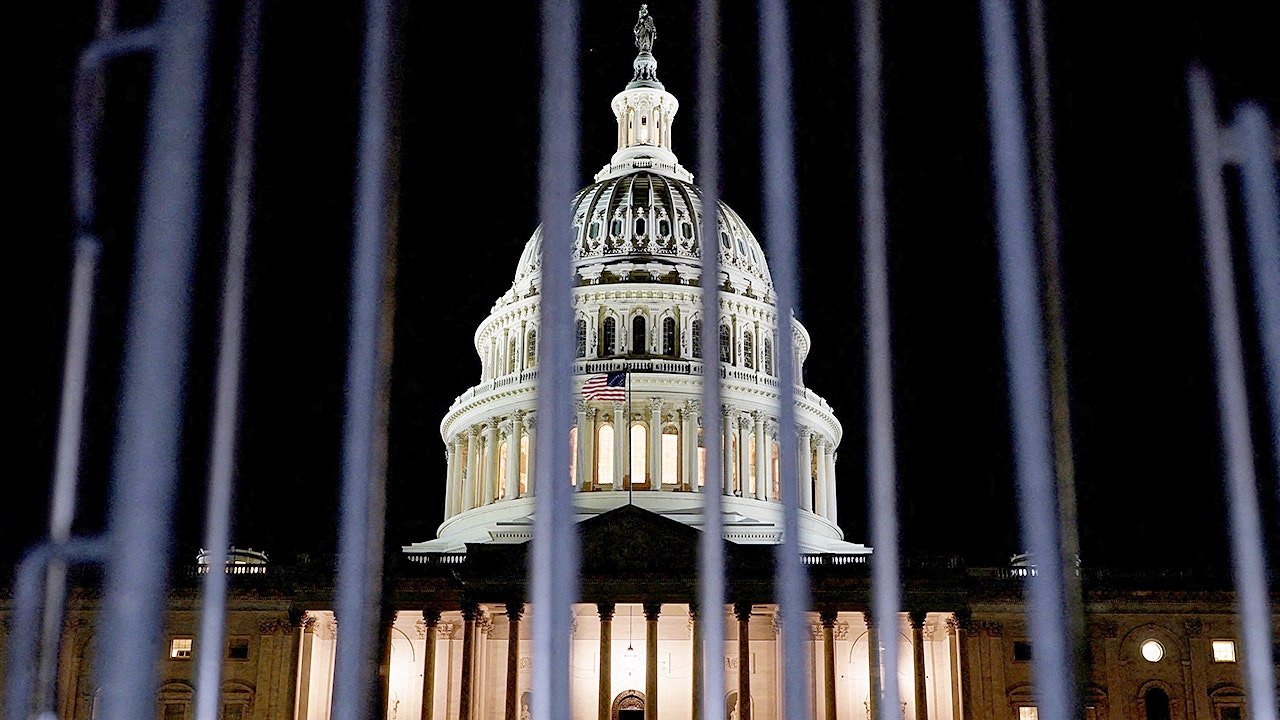
NEWYou can now listen to Fox News articles!
It must be something about October and two-year intervals in Congress.
Congress was paralyzed for more than three weeks without a leader two years ago this October as the House unceremoniously ousted former Speaker Kevin McCarthy, R-Calif.
And Congress is paralyzed again this October – unable to find the votes to re-open the government.
«There’s nothing for us to negotiate,» said House Speaker Mike Johnson, R-La. «We did the job to keep the government open. And now it’s on the Senate Democrats.»
OMINOUS RED AND ORANGE SKIES HAD CAPITOL HILL TAKE NOTICE AS SHUTDOWN LOOMED
But Democrats say that’s the problem. There haven’t been negotiations. Save for a brief White House meeting last week between President Trump and the top four bipartisan, bicameral Congressional leaders a day before the shutdown.
«The Majority Leader in the Senate, John Thune, R-S.D., talks about, ‘we’ll have conversations.’ We need more than conversations. We need a real negotiation,» said Sen. Mark Kelly, D-Ariz., on Fox.
So there are no talks. And the sides are seemingly talking past each other.
It seems as though Congress is positively heading nowhere as shutdown negotiations drag on. (Elizabeth Frantz/Reuters)
So, they’ve turned to handicapping.
Sen. John Kennedy, R-La., gamed out that the shutdown would run another week.
«It won’t end until everybody in the Senate takes their ego out back and shoots it. And then it’ll end,» predicted Kennedy.
It always is, and always will be about the math.
Senate Republicans can conjure up the votes of 55 senators to break a filibuster on the House-passed bill to fund the government. But they need 60 yeas. And Republicans are determined to stick to their playbook.
«I can tell you there’s more than five Democrats in the Senate who know that (Senate Minority Leader) Chuck Schumer, D-N.Y. has led them into a box canyon with this Schumer shutdown,» said Sen. Tom Cotton, R-Ark., on Fox. «But the consequences will start to pile up.»
REPORTER’S NOTEBOOK: SENATE REVOTES TODAY ON ENDING GOVERNMENT SHUTDOWN
White House spokeswoman Karoline Leavitt wouldn’t directly answer a question about what would trigger federal firings. But Leavitt made clear that jobs hung in the balance.
«We don’t want to see people laid off. But unfortunately, if this shutdown continues, layoffs are going to be an unfortunate consequence of that,» said Leavitt.
Democrats excoriated the Trump Administration for hinting it would cut programs and jobs in agencies important to Democrats.
«Americans really hate bullies. And this kind of bullying from the White House is going to backlash because they understand that an authoritarian president uses grants to New York for infrastructure, laying off workers, deliberately inflicting pain,» predicted Sen. Richard Blumenthal, D-Conn. «Don’t inflict unnecessary pain and then boast about it.»
Some Republicans practically reveled in the White House approach.
«All’s fair in love and war. I think that there’s a price to pay for the Democrats shutting this down,» said Sen. Roger Marshall, R-Kan. «These will be part of the consequences.»

Sen. Peter Welch, D-Vt., argued that the shutdown is «collective punishment» and undercuts Republicans equally harshly. (Tierney L. Cross/Getty Images)
But one Democrat argued that the Trump administration’s gambit would also undercut Republicans and voters who supported the president. Even in blue states.
«There’s a lot of folks in Vermont, there’s lot of folk in Illinois who voted for President Trump. So this sort of collective punishment,» said Sen. Peter Welch, D-Vt., on Fox. «I think it’s a really bad idea.»
But the president is coy about when the shutdown could trigger federal layoffs.
«It could,» said the president. «At some point it will.»
Transportation Secretary Sean Duffy noted that his department saw «a slight uptick» in aviation safety employees who were calling out sick during the shutdown – since they weren’t being paid.
«They’re thinking about how am I going to get a paycheck? How do I make a car payment,» said Duffy.
WHITE HOUSE ESCALATES SHUTDOWN CONSEQUENCES AS DEMOCRATS SHOW NO SIGNS OF BUDGING: ‘KAMIKAZE ATTACK’
But if you squint, you can see a few signs of bipartisanship.
Johnson is discussing Obamacare subsidies with one prominent Democrat.
«I had I think a fruitful discussion, with Sen. Patty Murray, D-Wash., about two days ago, a day or so ago,» said Johnson on efforts to address looming Obamacare premium spikes. «Whatever the conference committee comes up with, I will put on the floor. I’m ready to go.»
But Schumer is skeptical about the Speaker’s promises.
«Delay has always been Speaker Johnson’s MO. Speaker Johnson has survived by kicking the can down the road,» said Schumer. «When Johnson says later, they know he means never.»
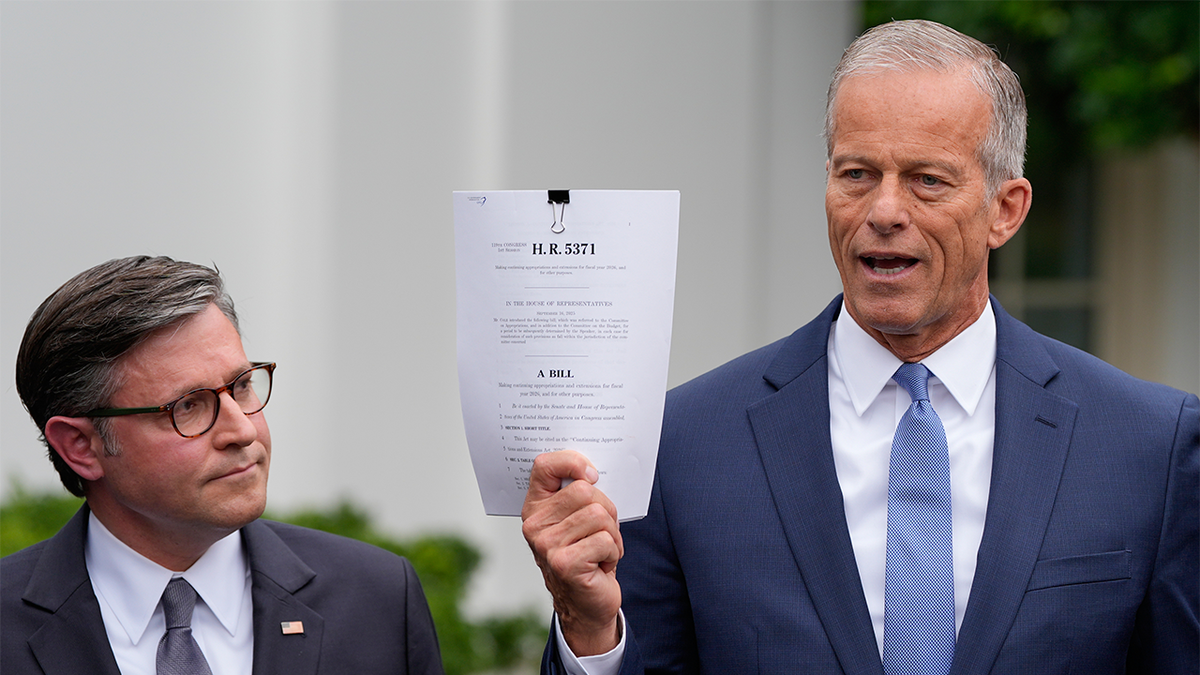
Senate Majority Leader John Thune, R-S.D., insists Democrats are «playing a losing game.» (Alex Brandon/AP Photo)
Tension is building as the shutdown barrels into its second week as lawmakers spin in circles.
«I realize that my Democrat colleagues are facing pressure from members of their far left base. But they’re playing a losing game here,» said Thune.
But each side is now engaged in a game of parliamentary chicken. Republicans won’t budge from their demand that Senate Democrats approve their funding plan. And Democrats won’t relent from their insistence that the sides shore up Obamacare subsidies.
«I’m not going to vote to reopen the government until I see a way that we can do that,» said Sen. Chris Coons, D-Del.
Even some Republicans worry about Obamacare price spikes.
«There are some folks in what is the new part of the Republican Party, which is blue-collar workers,» said Rep. Jeff Van Drew, R-N.J., on Fox Business. «We have to be careful how we do this. We just shouldn’t cut it. We should make sure we use a scalpel and not a sledgehammer.»
SHUTDOWN IGNITES STRATEGIST DEBATE: WILL TRUMP AND GOP PAY THE POLITICAL PRICE IN 2026?
But even if bipartisan senators were to forge a deal, the plan may slam into a brick wall in the House.
«Republicans have spent most of their careers being against Obamacare. Why would they expand it and add a subsidy on top of a subsidy?» asked House Appropriations Committee Chairman Tom Cole, R-Okla.
A debate is now raging over which side will cave. Or which party faces political consequences.
Naturally, Republicans believe Democrats will pay a price.
«Their radical base just wants to see them up here fighting Donald Trump, not over any particular issues,» said House Majority Leader Steve Scalise, R-La.
But Democrats don’t see a political downside.
«Are you concerned in any way about the political ramifications that voters might blame your side down the road?» yours truly asked House Minority Leader Hakeem Jeffries, D-N.Y.
«The American people are crystal clear on who shut down the government. Crystal clear,» replied Jeffries.
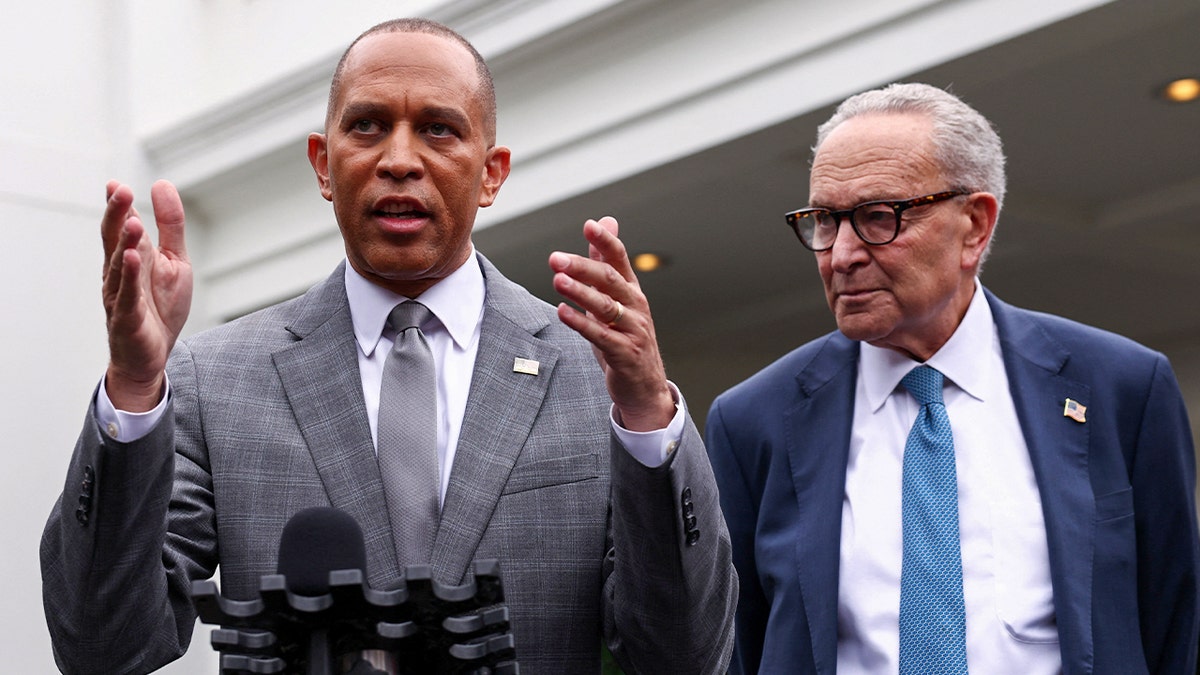
House Minority Leader Hakeem Jeffries, D-N.Y., suggested Americans are «crystal clear» on who shoulders the blame for the shutdown. (Kevin Lamarque/Reuters)
However, some lawmakers doubt that voters care about who «shut down the government.»
«My constituents don’t care about the finger pointing. They just want us to govern,» said Rep. Madeleine Dean, D-Pa.
As the impasse deepens, the Senate shifted from parliamentary posturing to ecumenical intercession.
«On this third day of the government shutdown, inspire them to work for your glory in all they think, say, and sow,» prayed Senate Chaplain Barry Black during his invocation of the Senate last week.
HERE’S WHAT TRUMP WANTS TO DO TO RESHAPE THE FEDERAL GOVERNMENT DURING THE SHUTDOWN
And then there are the sideshows. The White House sent out a meme portraying Budget Director Russ Vought as the Grim Reaper. And the president trolled Jeffries with an AI-generated social media video, casting Jeffries in a sombrero and a mustache with mariachi music playing in the background.
At the same time, Republicans warned about grave shutdown consequences.
«Real pain is being endured by real people,» said Johnson.
But in the next breath, the Speaker defended the president making light of circumstances, describing the trolling as «entertainment.»
«That’s what President Trump does. And people are having fun with this,» said Johnson.
I didn’t let that go.
«On one hand, you say this is very serious. That people have jobs on the line. On the other hand, you say, ‘oh, this is just fun and games and they’re trolling.’ Which is it?» I inquired.
«What they’re trying to have fun with, trying to make light of, is to point out the absurdity of the Democrats’ position,» answered Johnson.
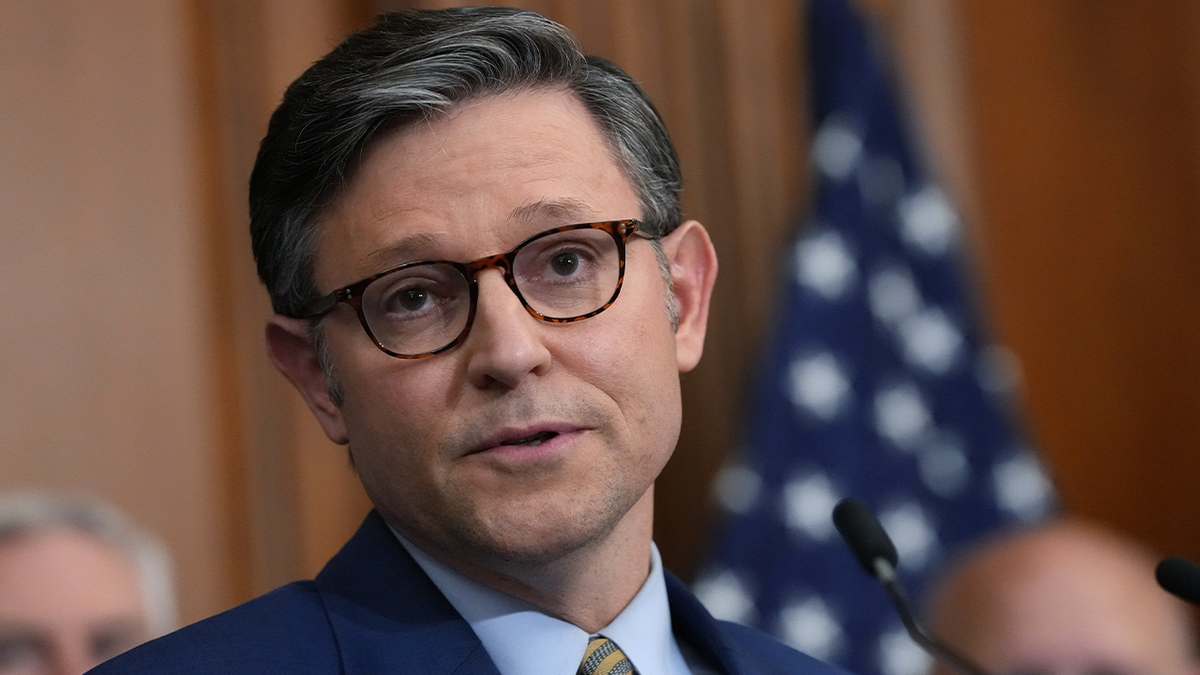
House Speaker Mike Johnson, R-La., defended President Trump’s making light of current circumstances as «entertainment.» (Kevin Dietsch/Getty Images)
So we don’t know if or when Vought will drop the anvil on federal workers. But one senator who caucuses with the Democrats and voted for the GOP plan, signaled his support could wane if Republicans overplay their hand.
«If they start firing thousands of people or clawing back other kinds of programs, I think, it could hurt their chances of getting this resolved,» said Sen. Angus King, I-Maine.’
The Senate has now blocked the House-approved spending package on six separate occasions. The sides are having casual conversations. But nothing has happened.
CLICK HERE TO GET THE FOX NEWS APP
It’s as though Congress is on a merry-go-round to nowhere, just going around and around. Everyone’s getting dizzy. And just wants to dismount.
congress,government shutdown,house of representatives politics,senate,white house
INTERNACIONAL
Europa, entre la guerra de Ucrania, el acoso ruso y la crisis política en Francia, que amenaza al euro

Francia, un caso sistémico
Júpiter se esfumó
¿Y ucrania?

 CHIMENTOS3 días ago
CHIMENTOS3 días agoMica Viciconte confesó por qué no fue a conocer a su primer sobrino: “Me cuesta, no me hallo”

 POLITICA3 días ago
POLITICA3 días agoEn la antesala de la elección de la CGT, los gremios del transporte refuerzan su conducción y su perfil opositor a Milei

 CHIMENTOS2 días ago
CHIMENTOS2 días agoQuién es la Gran Hermano que se separó y se puso de novia con un futbolista argentino: «Catalina Gorostidi está con Germán Ferreyra»












